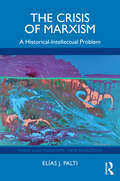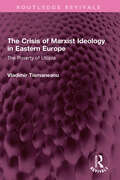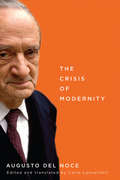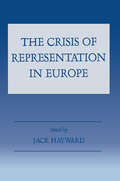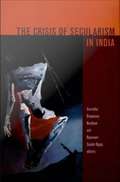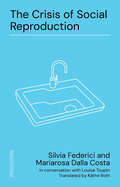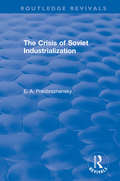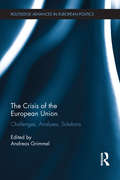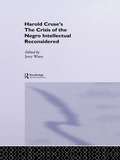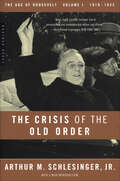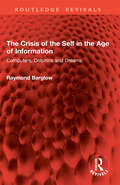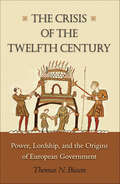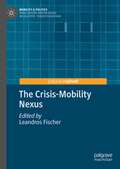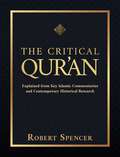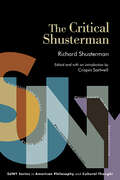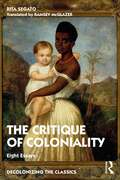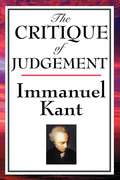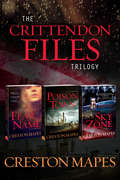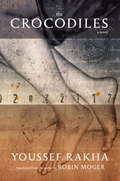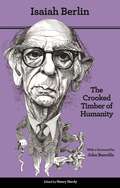- Table View
- List View
The Crisis of Marxism: A Historical-Intellectual Problem (Marx and Marxisms)
by Elías J. PaltiIn this book, Elías J. Palti analyzes the writings of key thinkers who have theorized the present situation of Marxism: Perry Anderson, Fredric Jameson, Ernesto Laclau, Slavoj Žižek, Judith Butler, Alain Badiou, and Jacques Derrida. His aim is to interrogate what appears to be the final crisis of Marxist political tradition from a historical-intellectual point of view, placing it within a broader framework, which is the present crisis of politics, at large. Yet, it also reveals why we cannot, even then, avoid confronting it, stubbornly trying to think of what seems to be unthinkable today, namely, the idea of an emancipatory horizon.Unlike traditional works of political philosophy, The Crisis of Marxism: A Historical-Intellectual Problem does not intend to provide political or philosophical answers to today’s dislocation of politics. Instead, it aspires to clarify the nature of the questions that such a situation raises and demonstrates why the current crisis of Marxism contains some fundamental clues for it.
The Crisis of Marxist Ideology in Eastern Europe: The Poverty of Utopia (Routledge Revivals)
by Vladimir TismaneanuFirst published in 1988, The Crisis of Marxist Ideology in Eastern Europe states that since de-Stalinisation began in Eastern Europe, the ‘dead hand’ of institutional Marxism has been eroded by revisionist Marxism, with the turn to young Marx and the philosophy of human emancipation to undermine prevailing orthodoxies. But this revisionism clung to the old socialist dogmas and refused a total break with the system, and the effort eventually failed. The result was the emergence of a dissident counterculture rejecting the system entirely. Independent social movements (such as unofficial peace groups and trade unions like Solidarity) have given this counterculture a major role in Eastern Europe, whilst the ruling elites have responded with confusion. Tismaneanu concludes that the only hope for the anti-totalitarian intellectuals of Eastern Europe is to oppose the regimes with non-Marxist ideas – otherwise they will be permanently reduced to the status of a hopeless, albeit heroic minority. This book will be of interest to students of economics, political science and international relations.
The Crisis of Modernity
by Augusto Del Noce Carlo LancellottiIn his native Italy Augusto Del Noce is regarded as one of the preeminent political thinkers and philosophers of the period after the Second World War. The Crisis of Modernity makes available for the first time in English a selection of Del Noce's essays and lectures on the cultural history of the twentieth century. Del Noce maintained that twentieth-century history must be understood specifically as a philosophical history, because Western culture was profoundly affected by the major philosophies of the previous century such as idealism, Marxism, and positivism. Such philosophies became the secular, neo-gnostic surrogate of Christianity for the European educated classes after the French Revolution, and the next century put them to the practical test, bringing to light their ultimate and necessary consequences. One of the first thinkers to recognize the failure of Marxism, Del Noce posited that this failure set the stage for a new secular, technocratic society that had taken up Marx's historical materialism and atheism while rejecting his revolutionary doctrine. Displaying Del Noce's rare ability to reconstruct intellectual genealogies and to expose the deep metaphysical premises of social and political movements, The Crisis of Modernity presents an original reading of secularization, scientism, the sexual revolution, and the history of modern Western culture.
The Crisis of Modernity (McGill-Queen's Studies in the History of Ideas #107)
by Carlo Lancellotti Augusto Del NoceIn his native Italy Augusto Del Noce is regarded as one of the preeminent political thinkers and philosophers of the period after the Second World War. The Crisis of Modernity makes available for the first time in English a selection of Del Noce's essays and lectures on the cultural history of the twentieth century. Del Noce maintained that twentieth-century history must be understood specifically as a philosophical history, because Western culture was profoundly affected by the major philosophies of the previous century such as idealism, Marxism, and positivism. Such philosophies became the secular, neo-gnostic surrogate of Christianity for the European educated classes after the French Revolution, and the next century put them to the practical test, bringing to light their ultimate and necessary consequences. One of the first thinkers to recognize the failure of Marxism, Del Noce posited that this failure set the stage for a new secular, technocratic society that had taken up Marx’s historical materialism and atheism while rejecting his revolutionary doctrine. Displaying Del Noce's rare ability to reconstruct intellectual genealogies and to expose the deep metaphysical premises of social and political movements, The Crisis of Modernity presents an original reading of secularization, scientism, the sexual revolution, and the history of modern Western culture.
The Crisis of Representation in Europe
by Jack HaywardThe 1994 European Elections focused public attention on the perception that representatives put integration above public interest. The contributors here critically assess the diagnosis of the ailment and the solutions that have been canvassed to remedy its causes and consequences.
The Crisis of Russian Democracy
by Richard SakwaThe view that Russia has taken a decisive shift towards authoritarianism may be premature, but there is no doubt that its democracy is in crisis. In this original and dynamic analysis of the fundamental processes shaping contemporary Russian politics, Richard Sakwa applies a new model based on the concept of Russia as a dual state. Russia's constitutional state is challenged by an administrative regime that subverts the rule of law and genuine electoral competitiveness. This has created a situation of permanent stalemate: the country is unable to move towards genuine pluralist democracy but, equally, its shift towards full-scale authoritarianism is inhibited. Sakwa argues that the dual state could be transcended either by strengthening the democratic state or by the consolidation of the arbitrary power of the administrative system. The future of the country remains open.
The Crisis of Secularism in India
by Rajeswari Sunder Rajan Anuradha Dingwaney NeedhamWhile secularism has been integral to India's democracy for more than fifty years, its uses and limits are now being debated anew. Signs of a crisis in the relations between state, society, and religion include the violence directed against Muslims in Gujarat in 2002 and the precarious situation of India's minority religious groups more generally; the existence of personal laws that vary by religious community; the affiliation of political parties with fundamentalist religious organizations; and the rallying of a significant proportion of the diasporic Hindu community behind a resurgent nationalist Hinduism. There is a broad consensus that a crisis of secularism exists, but whether the state can resolve conflicts and ease tensions or is itself part of the problem is a matter of vigorous political and intellectual debate. In this timely, nuanced collection, twenty leading Indian cultural theorists assess the contradictory ideals, policies, and practices of secularism in India. Scholars of history, anthropology, religion, politics, law, philosophy, and media studies take on a broad range of concerns. Some consider the history of secularism in India; others explore theoretical issues such as the relationship between secularism and democracy or the shortcomings of the categories "majority" and "minority. " Contributors examine how the debates about secularism play out in schools, the media, and the popular cinema. And they address two of the most politically charged sites of crisis: personal law and the right to practice and encourage religious conversion. Together the essays inject insightful analysis into the fraught controversy about the shortcomings and uncertain future of secularism in the world today. Contributors. Flavia Agnes, Upendra Baxi, Shyam Benegal, Akeel Bilgrami, Partha Chatterjee, V. Geetha, Sunil Khilnani, Nivedita Menon, Ashis Nandy, Anuradha Dingwaney Needham, Gyanendra Pandey, Gyan Prakash, Arvind Rajagopal, Paula Richman, Sumit Sarkar, Dwaipayan Sen, Rajeswari Sunder Rajan, Shabnum Tejani, Romila Thapar, Ravi S. Vasudevan, Gauri Viswanathan
The Crisis of Social Reproduction: Silvia Federici and Mariarosa Dalla Costa in conversation with Louise Toupin
by Silvia Federici Mariarosa Dalla Costa Louise ToupinIn a series of interviews with Louise Toupin, groundbreaking feminist thinkers Silvia Federici and Mariarosa Dalla Costa return to the movement they co-founded in 1972—the International Feminist Collective. The feminist collective originated the radical and controversial demand for wages for housework. From these powerful roots, they continue to explain how their political thinking developed over time, formulating an intersectional critique of neoliberal capitalism with a crisis of social reproduction at its heart.
The Crisis of Socialism in Europe
by Gary Marks Christiane LemkeThe revolutions in Eastern Europe and the recasting of socialism in Western Europe since 1989 have given rise to intense debate over the origins, character, and implications of the "crisis" of socialism. Is socialism in ideological, electoral, or organizational decline? Is the decline inevitable or can socialism be revitalized? This volume draws together historians and political scientists of Eastern and Western European politics to address these questions.The collection begins with an historical overview of socialism in Western Europe and moves toward the suggestion of a framework for a post-socialist discourse. Among the topics covered are: the birth and death of communism and a regime type in Eastern Europe; how different forms of national communism were smothered by Sovietization in the postwar period; the origins of revolutions in Eastern Europe; the potential for social democracy in Hungary; the role of the Left in a reunified German; and directions for the Left in general.Contributors. Geoff Eley, Konrad Jarausch, Herbert Kitschelt, Christiane Lemke, Andrei Markovits, Gary Marks, Wolfgang Merkel, Norman Naimark, Iván and Szonja Szelénya, Sharon Wolchik
The Crisis of Soviet Industrialization: Selected Essays (Routledge Revivals)
by PreobrazhenskyThis title was first published in 1979.
The Crisis of the European Union: Challenges, Analyses, Solutions (Routledge Advances in European Politics)
by Andreas GrimmelThe European integration project currently faces profound political, economic, legal, and societal challenges. These challenges seem increasingly to overburden the European Union as well as the cohesion among the Member States, and therefore pose a serious threat to the integration project. The EU faces a major task in coping with this situation and it is one that calls for new approaches and ideas This book addresses the major challenges confronting the EU, analyses the consequences for the integration project, and develops fresh perspectives on the EU’s future prospects for coping with the most debated, current and upcoming issues, such as the rise of Euroscepticism or the contested idea of an ‘ever-closer union’. Renowned experts in European Studies from the fields of political science, law, economics and sociology provide an interdisciplinary perspective on the different dimensions of the EU’s crisis-laden situation and question whether the EU’s existing problem-solving mechanisms and methods are sufficient to address the imminent tasks. This text will be of key interest to scholars and students of EU Politics, European Politics, European Governance, and more broadly European law, history and the wider social sciences.
The Crisis of the Negro Intellectual Reconsidered: A Retrospective
by Jerry WattsThirty-five years after its initial publication, Harold Cruse's "The Crisis of the Negro Intellectual," remains a foundational work in Afro-American Studies and American Cultural Studies. Published during a highly contentious moment in Afro-American political life, "The Crisis of the Negro Intellectual" was one of the very few texts that treated Afro-American intellectuals as intellectually significant. The essays contained in Harold Cruse's "The Crisis of the Negro Intellectual Reconsidered" are collectively a testimony to the continuing significance of this polemical call to arms for black intellectuals. Each scholar featured in this book has chosen to discuss specific arguments made by Cruse. While some have utilized Cruse's arguments to launch broader discussions of various issues pertaining to Afro-American intellectuals, and others have contributed discussions on intellectual issues completely ignored by Cruse, all hope to pay homage to a thinker worthy of continual reconsideration.
The Crisis of the Old Order 1919-1933 (The Age of Roosevelt, Vol. I)
by Arthur M. SchlesingerThis is Arthur M. Schlesinger, Jr.'s account of the period following the first World War, 1919-1933, which saw the rise of big business and its fall into the Great Depression beginning in 1929, followed by the election of Franklin Roosevelt to the presidency in 1933.
The Crisis of the Old Order 1919–1933: The Age of Roosevelt, 1919–1933 (The\age Of Roosevelt Ser. #1)
by Arthur M. Schlesinger Jr.A prize–winning historian looks at FDR in the years from the Great War to the Great Depression: &“Full of personalities and anecdotes and humor and drama.&” —The New York Times The Crisis of the Old Order, 1919-1933, volume one of Pulitzer Prize- and National Book Award-winning historian and biographer Arthur M. Schlesinger, Jr.&’s Age of Roosevelt series, is the first of three books that interpret the political, economic, social, and intellectual history of the early twentieth century in terms of Franklin D. Roosevelt, the spokesman and symbol of the period. Portraying the United States from the Great War to the Great Depression, The Crisis of the Old Order covers the Jazz Age and the rise and fall of the cult of business. For a season, prosperity seemed permanent, but the illusion came to an end when Wall Street crashed in October 1929. Public trust in the wisdom of business leadership crashed too. With a dramatist&’s eye for vivid detail and a scholar&’s respect for accuracy, Schlesinger brings to life the era that gave rise to FDR and his New Deal and changed the public face of the United States forever. &“While a lot of ink has been spilled profiling FDR, Schlesinger's three-volume work remains among the best efforts.&” —Library Journal &“Probably no more thoughtful or surgical or compassionate study of the period in the United States has ever been written.&” —The New Yorker
The Crisis of the Self in the Age of Information: Computers, Dolphins and Dreams (Routledge Revivals)
by Raymond BarglowFirst published in 1994, in The Crisis of the Self in the Age of Information Raymond Barglow shows how contemporary technological environment furnish the unconscious with internal objects that hark back to a time in our lives prior to personal boundary formation and identity. The consequence is that our technological involvements help to disrupt and dismantle the ideal of the unified and sovereign self that in the past technology fostered.Throughout the book Raymond Barglow interweaves critical theory and psychoanalysis with an examination of artistic representations, media imagery and dreams to explore the conflictual dynamics of contemporary self-information and self-representation. This book is an important work for scholars and researchers of philosophy, psychoanalysis, and clinical psychology.
The Crisis of the Twelfth Century: Power, Lordship, and the Origins of European Government
by Thomas N. BissonMedieval civilization came of age in thunderous events like the Norman Conquest and the First Crusade. Power fell into the hands of men who imposed coercive new lordships in quest of nobility. Rethinking a familiar history, Thomas Bisson explores the circumstances that impelled knights, emperors, nobles, and churchmen to infuse lordship with social purpose.Bisson traces the origins of European government to a crisis of lordship and its resolution. King John of England was only the latest and most conspicuous in a gallery of bad lords who dominated the populace instead of ruling it. Yet, it was not so much the oppressed people as their tormentors who were in crisis. The Crisis of the Twelfth Century suggests what these violent people—and the outcries they provoked—contributed to the making of governments in kingdoms, principalities, and towns.
The Crisis-Mobility Nexus (Mobility & Politics)
by Leandros FischerSituated at the intersections of anthropology, migration, citizenship, and social movement studies, this volume theorises a crisis-mobility nexus by focusing on empirical case studies. These concern migration struggles; the entanglements of crisis, social mobility, and citizenship; as well as the impact of COVID-19 (im)mobility on social movements. By highlighting examples from these streams, the book illuminates entanglements between them, while emphasising the role of solidarity as well as de-solidarisation in creating, shaping, or resisting various regimes of mobility.
The Cristero Rebellion
by Jean A. MeyerThe Cristero movement is an essential part of the Mexican Revolution. When in 1926 relations between Church and state, old enemies and old partners, eventually broke down, when the churches closed and the liturgy was suspended, Rome, Washington and Mexico, without ever losing their heads, embarked upon a long game of chess. These years were crucial, because they saw the setting up of the contemporary political system. The state established its omnipotence, supported by a bureaucratic apparatus and a strong privileged class. Just at the moment when the state thought that it was finally supreme, at the moment at which it decided to take control of the Church, the Cristero movement arose, a spontaneous mass movement, particularly of peasants, unique in its spread, its duration, and its popular character. For obvious reasons, the existing literature has both denied its reality and slandered it.
The Critical Qur'an: Explained from Key Islamic Commentaries and Contemporary Historical Research
by Robert SpencerA unique resource for understanding the Islamic Holy Book.As Islamic terrorism becomes a distressingly common feature of life in North America and Europe, it has become increasingly important for non-Muslims to be aware of the ideology that animates and motivates jihad violence and Sharia oppression of women and others—an ideology that&’s rooted in Islam&’s holy book, the Qur&’an. English-speaking people, however, have found attempts to understand the Qur&’an and Islam impeded by unclear, densely worded translations and explanatory notes written by Islamic apologists attempting to conceal, rather than reveal, how Islamic jihadis use the texts and teachings of the Qur&’an to justify violence and supremacism, and to make recruits of peaceful Muslims. The Critical Qur&’an, in contrast, makes clear the passages that are used to incite violence. Historian and Islamic scholar Robert Spencer elucidates the Qur&’anic text with extensive references to the principal tafsir, or commentaries, that mainstream Muslims use today to understand the Qur&’an, showing how interpretations that sanction violence are unfortunately not outliers, but central in Islamic theology. The Critical Qur&’an is the Islamic counterpart to numerous critical and skeptical editions of the Bible that have appeared over the last century and more. It is the one edition of Islam&’s book that doesn&’t shy away from elucidating why the holy book of Islam is so frequently quoted and referred to with reverence by people who commit and/or justify acts of violence. It is a basic resource for everyone who wishes to understand the persistent phenomenon of Islamic terrorism, and the peculiar provenance of this most provocative book.
The Critical Shusterman (SUNY series in American Philosophy and Cultural Thought)
by Richard ShustermanCollecting sixteen key texts on a broad range of key philosophical topics enables readers to perceive the scope of Shusterman's philosophy and appreciate its systematic aspects.Richard Shusterman is one of today's foremost philosophers. His influential and widely translated work is distinctive for its originality and its integration of multiple philosophical perspectives (analytic philosophy, phenomenology, hermeneutics, critical theory, and East Asian thought) to create a new transcultural pragmatist vision. Although most famous for his groundbreaking writings in aesthetics, somatic philosophy, and philosophy as an art of living, these texts are integrally connected with Shusterman's vital views on ontology, epistemology, and philosophy of mind, ethics, and politics. Collecting sixteen key texts on this broad range of topics, The Critical Shusterman enables readers to perceive the scope of Shusterman's philosophy and appreciate its systematic aspects. Editor Crispin Sartwell's superb introduction highlights those aspects in assessing Shusterman's thought in the context of contemporary philosophy while suggesting ways that Shusterman's project could be developed in the future.
The Critique of Coloniality: Eight Essays (Decolonizing the Classics)
by Rita SegatoThis translation of Rita Segato’s seminal book La crítica de la colonialidad en ocho ensayos offers an anthropological and critical perspective on the coloniality of power as theorized by the Peruvian thinker Aníbal Quijano. Segato begins with an overview of Quijano’s conceptual framework, emphasizing the power and richness of his theory and its relevance to a range of fields. Each of the seven subsequent chapters presents a scenario in which a persistent colonial structure or form of subjectivity can be identified. These essays address urgent issues of gender, sexuality, race and racism, and indigenous forms of life. They set the decolonial perspective to work, and are connected by two central preoccupations: the critical analysis of coloniality and the effort to reimagine anthropology as "responsive anthropology," a practice at once answerable and useful to the communities previously regarded as the "objects" of ethnographic thought. The Critique of the Coloniality makes important and original contributions to our understanding of colonial and decolonial processes, drawing on the author’s experience of feminist and antiracist movements and struggles for indigenous and human rights. This book will appeal to students and scholars working in anthropology, Latin American studies, political theory, feminist and gender studies, indigenous studies, and anticolonial, post-colonial, and decolonial thought.
The Critique of Judgment
by Immanuel Kant James Creed MeredithThis 1790 polemic by one of philosophy's most important and influential figures attempts to establish the principles that support the faculty of judgment. Kant's third critique -- after Critique of Practical Reason and Critique of Pure Reason -- remains one of the most important works on human reason. The Critique of Judgment informs the very basis of modern aesthetics by establishing the almost universally accepted framework for debate of aesthetic issues.<P><P> As in his previous critiques, Kant seeks to establish a priori principles. The first part of this work addresses aesthetic sensibility. The human response to specific natural phenomena as beautiful, he asserts, is a recognition of nature's harmonious order that corresponds to a mental need for order. The critique's second half focuses on the apparent teleology in nature's design of organisms. The philosopher declares that the mind is predisposed to find purpose and order in nature, and this predisposition forms the main principle underlying all our judgments. Although this could be interpreted as an argument in favor of a creator, Kant insists that a supernatural dimension or the existence of God cannot be proven -- such considerations lie beyond the realm of reason, solely within the province of faith.
The Crittendon Files Trilogy
by Creston Mapes#1 FEAR HAS A NAME: It was more than a break-in. More than a stalking. It was personal. When a stalker targets his family, journalist Jack Crittendon must uncover who the person is and what his motives are--if he is to protect the ones he loves. It will lead Crittendon into a world of behind-closed-door secrets and faith gone awry, as does his investigation of a missing pastor, whose apparent suicide is more than it appears. Each move Crittendon makes weaves him tighter and tighter into a web of lies, greed, hypocrisy, sin, and danger. He believed he'd never give in to fear. But that was before. And holding on to his faith won't be easy. Nor will keeping his family safe, and ending the terror. Because that might require him to step over lines he never dared to cross.#2 POISON TOWN: People are sick and dying. Rumors are swirling. Some claim chemicals leaking from a manufacturing plant are causing the cancer that's crippling people on the poor side of Trenton City, Ohio. Yet nothing at the plant appears amiss. The problem remains a mystery until reporter Jack Crittendon's long-time mechanic falls ill and he investigates. Soon Jack becomes engulfed in a smokescreen of lies, setups, greed, and scandal. The deeper he digs, the more toxic the corruption he uncovers. As he faces off with the big-time players behind the scenes and tries to beat the clock before more people die, he realizes the chillingly unthinkable--he knows too much.#3 SKY ZONE: Jack and Pamela Crittendon have hit the breaking point. After months out of work as a reporter, Jack is playing Mr. Mom and working part-time at Festival Arena with his survivalist friend Brian Shakespeare. Meanwhile, Pamela has gone back to work full-time while eight months pregnant. Having her recently widowed mother on hand isn't making matters any easier. With financial pressures boiling, Jack reports for duty at a rally for controversial presidential candidate Martin Sterling where he expects a mindless night on the job. But when Homeland Security picks up intel about a potential terrorist threat, Jack and Shakespeare are thrust into a life-or-death battle to save their own lives--and the lives of thousands of innocent people.
The Crocodiles
by Robin Moger Youssef RakhaSet in Cairo between 1997 and 2011, The Crocodiles is narrated in numbered, prose poem-like paragraphs, set against the backdrop of a burning Tahrir Square, by a man looking back on the magical and explosive period of his life when he and two friends started a secret poetry club amid a time of drugs, messy love affairs, violent sex, clumsy but determined intellectual bravado, and retranslations of the Beat poets. Youssef Rakha's provocative, brutally intelligent novel of growth and change begins with a suicide and ends with a doomed revolution, forcefully capturing thirty years in the life of a living, breathing, daring, burning, and culturally incestuous Cairo. From the Trade Paperback edition.
The Crooked Timber of Humanity: Chapters in the History of Ideas - Second Edition
by Isaiah Berlin"Out of the crooked timber of humanity, no straight thing was ever made."--Immanuel Kant Isaiah Berlin was one of the most important philosophers of the twentieth century--an activist of the intellect who marshaled vast erudition and eloquence in defense of the endangered values of individual liberty and moral and political plurality. In The Crooked Timber of Humanity he exposes the links between the ideas of the past and the social and political cataclysms of our own time: between the Platonic belief in absolute truth and the lure of authoritarianism; between the eighteenth-century reactionary ideologue Joseph de Maistre and twentieth-century Fascism; between the romanticism of Schiller and Byron and the militant--and sometimes genocidal--nationalism that convulses the modern world. This new edition features a revised text that supplants all previous versions, a new foreword in which award-winning novelist John Banville discusses Berlin's life and ideas, particularly his defense of pluralism, and a substantial new appendix that provides rich context, including letters by Berlin and previously uncollected writings, most notably his virtuoso review of Bertrand Russell's A History of Western Philosophy.
